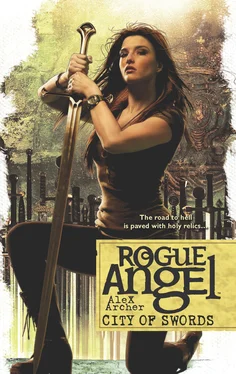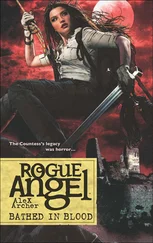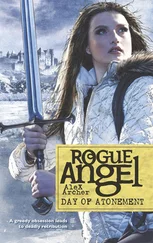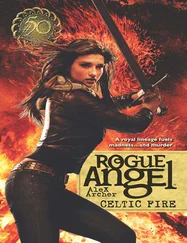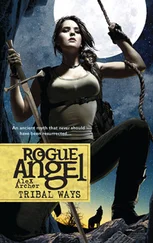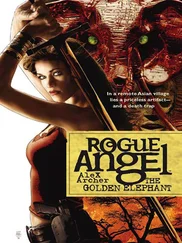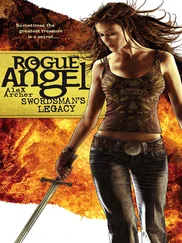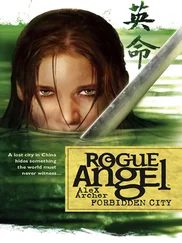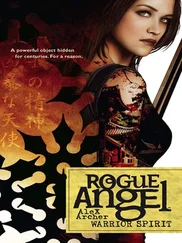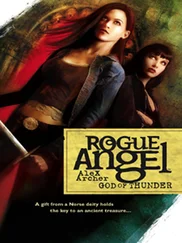“Damn, Annja.” He held the door for her. “A dog-man, eh?”
“A cynocephalus.”
“Yeah. Yeah. I know what he’s called. I just hope he’s had his rabies shot.”
Annja shot him a look. “We’ll walk. It’s not far from the hotel. The Centre Historique.”
“Our old hotel was closer.”
“You’re going to complain about everything today, aren’t you, Rem?”
He said yes one block later, when the gray afternoon sky opened up and drenched them.
Their previous lodgings, the Avignon Grand Hotel, had been much closer, practically across the street from their meet at the Palais des Papes. But their stay there hadn’t sat well with Annja, after the beating she’d taken in the stairwell and the theft of her laptop from her room. She’d told Rembert about the theft, but didn’t mention the beating. After she’d come to at the bottom of the stairs, picked herself up and staggered back to her room, she’d discovered that all her things were just where she’d left them, but there were tiny differences that raised the hairs on the back of her neck. And there was the missing computer. So she’d relocated the crew to the Danieli and reported the theft to the police. Again, she didn’t report the beating. Annja healed quickly—a strange phenomenon somehow linked to the sword—and she didn’t want to explain that particular quirk to her photographer or the police.
They were soaked by the time they reached the cluster of centuries-old buildings at the edge of the Rhône. It looked as if the walls of the medieval structures might tumble down the bank and spill into the river. The grandest, the Palais des Papes, was considered one of the most important Gothic buildings in Europe. Annja had been through it twice in the past.
They shook themselves off just inside the entrance.
“The palace of popes, eh?” Rembert mused. “And the place of dog-men. Hope our fellow has been nice and dry in here.”
Annja cocked her head.
“You never had a dog, did you?” he pressed.
Annja had been raised in an orphanage in New Orleans. There was a resident cat, but she’d never caught more than a glimpse of it—the thing always fled from the children. Her life had been too crowded for pets, and now she traveled so much. She envied people who had such companionship. “No. No dogs.”
“Well, they stink to high heaven when they get wet.”
“I like you better when you smile.”
“That doesn’t mean I think this interview is a good idea.” Rembert brushed the water drops off his camera, then dug a dry handkerchief out of his pocket to wipe it. “So, what’s with this place? Enlighten me a little. Only got an outside shot of it two days ago for color on the city.”
“Gascon Bertrand de Goth—Pope Clement V—moved the papacy here after his election in 1305. This building went up after his death. Terribly expensive...”
“You’d think religious people would spend the money on the poor. It’d be the religious thing to do, wouldn’t it?” Rembert panned the camera around the interior and then got a shot of Annja with her wet hair plastered against the sides of her face.
“This was fortified to withstand attacks, expanded over the years, the wings flanked with high towers. Adjoining buildings were added to enclose the courtyard.”
“Beautiful, but excessive,” Rembert said.
Despite the archaeological significance of the place, Annja agreed with him. A dozen tourists wandered in the cloister, and they looked so tiny under the high, arched ceiling. Like ants. No doubt the rain was keeping the bulk of the tourists away. She tried to imagine what the place had looked like when the popes walked these chambers, before it had been seized and sacked. Before it became the setting for a massacre of revolutionaries in the late 1700s and was turned into a barracks and prison. Frescoes had been obliterated, the interior woodwork used to build stables. But in the early 1900s, when it became a museum, restoration began, and the renovation work still continued all these years later.
The place carried the smell of old stone and cleaning products, and through the open front door came the smell of the wet city and the Rhône. Rembert focused his camera on the tourists.
“So what’s our dog-man look like? A Great Dane? Boxer? A bitzer?”
“Bitzer?”
“Ah, that’s right, no dogs. A bitzer...bits of this and bits of that. A mutt.”
Annja studied the tourists. “No idea. Doug’s note said Gaston would find us. We just have to be visible and wait for him.”
“Wait. That’s great.” Rembert edged farther in, dribbling water on the stone. Annja followed him, looking down corridors that led to other wings. “So we wait. How long? Let’s give him an hour, tops. Would maybe still give us time to catch that plane, and—”
“Mrs. Creed?”
Annja and Rembert whirled around to face a wiry youth standing just past the entrance, squinting against the rain. His oversize pants and jacket made him look small.
“Miss. Miss Creed.” Annja stepped closer. Rembert began filming. “Are you Gaston?” For some reason she had expected someone older.
“Gaston? No. Not me.” The rest of his words were in French. “My brother’s name is Gaston.” He twisted the ball of his foot against the stone. “I am to bring you to him.”
“This isn’t the guy,” Annja whispered to Rembert. “This is his brother.”
The air hissed out between her cameraman’s teeth. He looked at his watch.
“We don’t have time for a scavenger hunt. Gaston was supposed to meet us here. That was the message, right, Annja? That was the deal. We—”
“He doesn’t like to be seen in public, Miss Creed,” the kid interrupted, still speaking French. “He’s only doing this because of the money. You promised money for the interview.”
Rembert recognized the word for money.
“We’re paying for an interview, Annja?”
It happened sometimes. She nodded and said in English, “According to Doug, we’re paying this guy.”
“This just gets better and better.”
Annja almost called it quits, between Rembert’s attitude and the fact that Gaston wasn’t here. But her gut told her to pursue it. “Is he close, your brother? Nearby?” She repeated the questions in French.
The kid nodded. “Under the bridge. Away from the rain and people. He hides there and...you will pay him to talk to you, right? He said he would only talk for money.”
“He talks, and then I make arrangements to pay him. I didn’t bring the money with me.” Annja had not wanted to set herself up for a mugging. “I’m not carrying cash.” She pulled her pants pockets inside out to show him they were empty. “The money is at the hotel. He talks to me, you come back with me to the hotel and get it. I promise to pay.”
The nod became vigorous. “All right. That is all right, I guess. You come now, and then you give me money.”
He turned and tromped out into the rain, Annja and a reluctant Rembert following.
“Wait!” Annja called. “What’s your name?”
Without stopping, the boy replied “Jacques” over his shoulder.
“It’ll be a bitzer, that’s for sure,” Rembert grumbled.
The bank was slick, but Annja navigated it. Her cameraman was not as sure-footed and slid halfway down on the seat of his pants, cradling his camera to his chest and cursing when he bumped across rocks. The city above was clean, but the riverbank was another matter. Plastic foam cups, crushed cigarette packs and other assorted garbage pooled in low spots. The stink of refuse and sodden earth was strong.
“Let’s wrap this up,” Annja said, extending a hand to Rembert.
“I second and third that.” He checked over his camera and wiped at the water again, a futile gesture, as it was raining harder. “Doug’s bad idea is getting worse and worse and worse.”
Читать дальше
